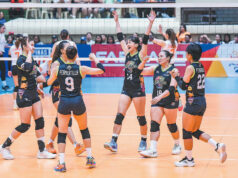FOR sports buffs who welcome controversy as part and parcel of competition, the United States Open women’s singles final is unquestionably a gift that keeps on giving. A full four days after the Arthur Ashe Stadium played host to a bizarre awarding ceremony in which the winner was being propped up by the vanquished and not the other way around, feedback continues to come. The latest is from chair umpires, who believe Carlos Ramos acted rightly in penalizing eventual runner-up Serena Williams thrice for code violations.
The officials couldn’t have been more on the mark. Taken individually, the transgressions deserved sanction. First, Williams was cited for receiving coaching instructions early in the second set, netting her a warning. Second, she smashed her racket on the DecoTurf after having been broken later in the set, costing her a point. And third, she subjected Ramos to verbal abuse, leading to a forfeited game close to the end of the set. She was guilty on all counts.
On the other hand, matches don’t happen in a vacuum, precisely the reason umpires are given leeway and discretion to enforce regulations as they see fit. And in prominent settings, as Williams’ battle against Naomi Osaka most certainly was, prudence should have been foremost in Ramos’ mind. Considering that he’s one of but a handful of chair arbiters with a gold badge signifying excellence in work, he must have understood the value of exercising maximum tolerance, particularly on the last violation.
True, Williams had no right to call Ramos “a thief” for allegedly stealing a point from her in the previous set. On the other hand, the score was then 4-3 in Osaka’s favor; the end was near, and the latter had been playing close to flawless tennis to ensure victory. Making it an unearned 5-3 would have — and ultimately did — cast a cloud on the outcome. Had he let things pass, the celebration would have more fittingly reflective of the upset. Instead, everybody wound up feeling cheated: the winner for being denied the feeling of dominating the overwhelming favorite for a first major title; the loser for being denied the chance, however minuscule, to come back; and the spectators, for being denied, the proper culmination of a fortnight of outstanding play.
Moving forward, the sport’s governing bodies need to use the experience as an opportunity to institute much-needed changes to rules. Out-in-the-open coaching should be allowed, period; it’s being done, anyway, albeit through surreptitious signals that place even more burden on umpires to call or not to call. Other violations should be cited with more consistency, whether strictly or in the breach, so as to eliminate the suspicion of bias. In the US Open men’s singles final, for instance, would-be champion Novak Djokovic repeatedly went over the allotted 25 seconds to serve, but wasn’t called for it.
If there’s any silver lining to the affair, it’s that Osaka proved her star quality long after the match. She may be all of 20, but the poise with which she met adversity at a time when she had every reason to pout for not getting her due stands as her biggest achievement. With her idol Williams nearing the end of a remarkable career that hasn’t been all roses, she figures to serve as a finer example of sportsmanship and class. Tennis should be so lucky.
Anthony L. Cuaycong has been writing Courtside since BusinessWorld introduced a Sports section in 1994.



